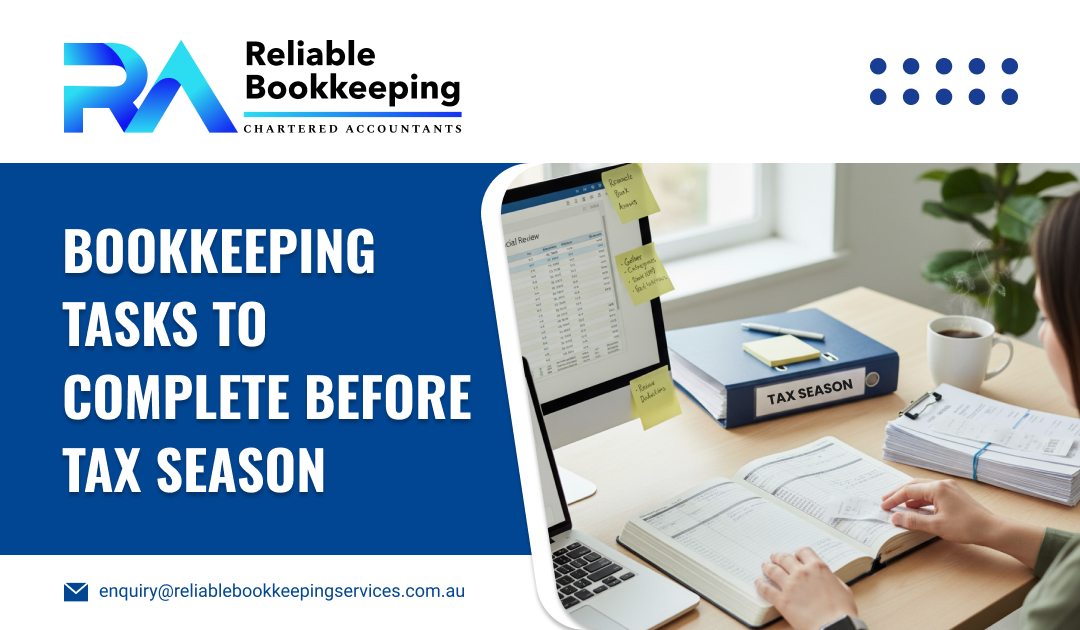For every business owner, it’s essential to stay ahead of tax deadlines, especially if you often deal with numerous financial tasks with limited resources. A well-structured bookkeeping checklist is crucial for managing tax obligations effectively, ensuring accurate and up-to-date records, and avoiding penalties. In this blog post, we’ll discuss a bookkeeping process that keeps your tax deadlines front and centre and supports a healthy financial performance throughout the year.
What Bookkeeping Tasks Should You Complete Before Tax Season?
A bookkeeping checklist is prepared to meet tax requirements and simplify record-keeping. Updating and completing bookkeeping tasks on time can keep your financial data accurate.
Record all financial transactions
Accurately recording financial transactions is crucial for a clear financial picture. Monitor income, business expenses, and other financial transactions, and ensure that all financial data is updated.
Organise Receipts and Invoices
Keep all receipts, invoices, and financial records organised. Consider using a reliable accounting software for added accuracy and convenience to reduce paperwork and enhance accessibility.
Reconcile Bank Statements
Double-check and compare your bank statements against the records stored in your accounting software to identify discrepancies. Preparing a bank reconciliation statement ensures all financial transactions are recorded accurately.
Monitor Accounts Receivable and Payable
Check and review outstanding invoices and follow up on late payments for healthy cash flow management. Track accounts payable to avoid penalties or late fees.
Review Financial Reports
Create financial reports, including balance sheets, profit and loss statements, and cash flow statements. These reports provide an insight into your business’s financial health and help with cash flow management.
Set Aside Funds for Taxes
Depending on monthly business expenses and income, allocate funds for taxes to avoid cash flow issues during tax time.
Prepare and Lodge BAS
Completing your business activity statement on time is crucial to ensure you are up to date with PAYG instalments, GST, and other relevant tax obligations.
Finalise Financial Statements
Prepare annual financial statements, such as balance sheets, profit and loss statements, and cash flow statements. A small business bookkeeper can help you prepare these financial statements, as these documents offer a complete overview of your business’s financial health.
Calculate Superannuation Contributions
Check and pay the required super contributions for each employee to meet the ATO requirements.
Evaluate Financial Goals and Performance
Use financial data to evaluate your business’s performance and adjust your company’s financial goals. This helps ensure you achieve financial health and stability.
Review Bookkeeping Practices
Check the effectiveness of your bookkeeping checklist and update it if required. Updating your bookkeeping checklist to reflect new tax obligations or business growth ensures continued compliance.
Prepare Tax Return Documentation
Collect and check all documentation required for tax return submission, including deductible expenses, revenue records, and depreciation schedules. Tax accountants can help you manage and prepare tax return documentation. So, make sure to hire a professional one near your area. When searching for a ‘small business accountant near me’, make sure to check their qualifications and experience.
Steps to Get Ready for Tax Season
The end of the financial year is a critical time period for every individual and business in Australia. It is an opportunity to claim your tax benefits, review your financial performance, and plan for the future. Here are some important steps to get ready for tax season.
- Verify Financial Information
Review all financial statements to ensure they match your bank records and other supporting documents. Confirming the accuracy of your data helps minimise errors in your tax return.
- Identify Eligible Deductions
List and categorise deductible business expenses such as utilities, travel costs, and equipment depreciation. Keeping precise records ensures you can claim the maximum deductions available.
- Lodge Your Tax Return
Submit your income tax return by the due date—typically October 31, or later if you are lodging through a registered tax agent.
Conclusion
Well-organised bookkeeping practices help small businesses stay compliant, maintain financial health, and optimise tax deductions. You can reach us by email, phone, or through our website to get our reliable bookkeeping services. Don’t miss the opportunity to save money, time, and hassle with us.

